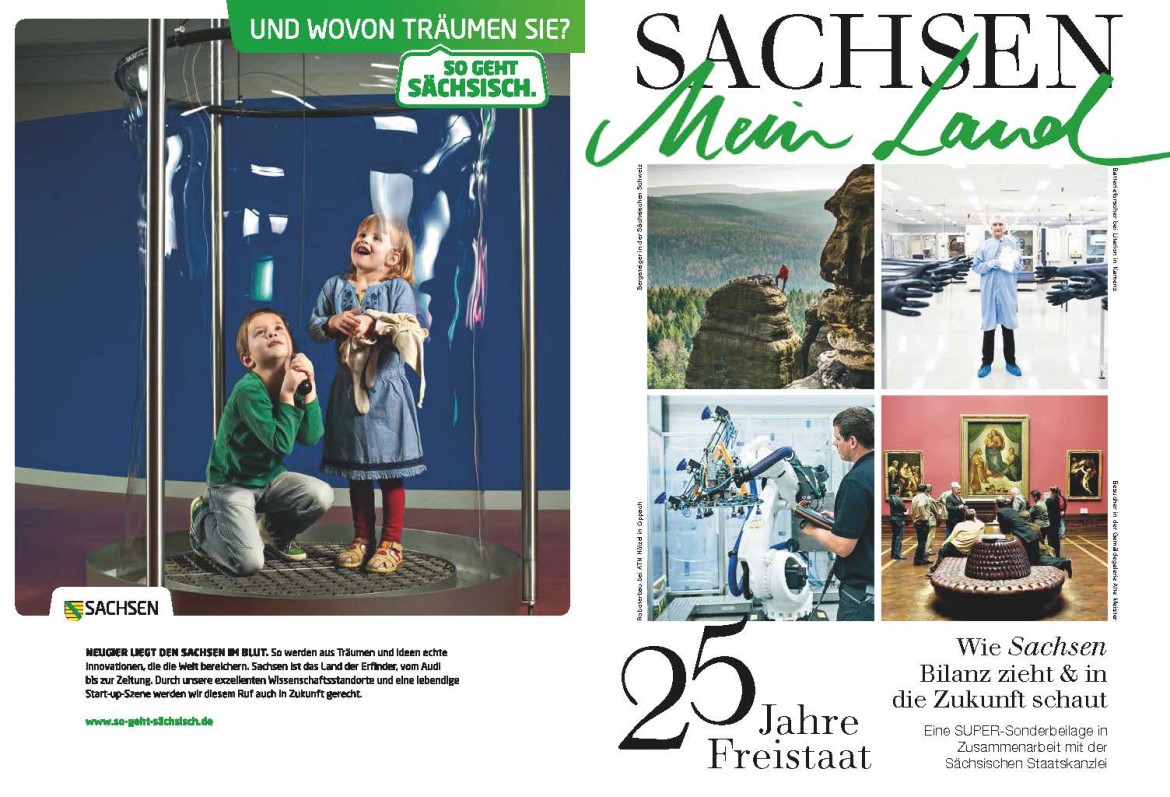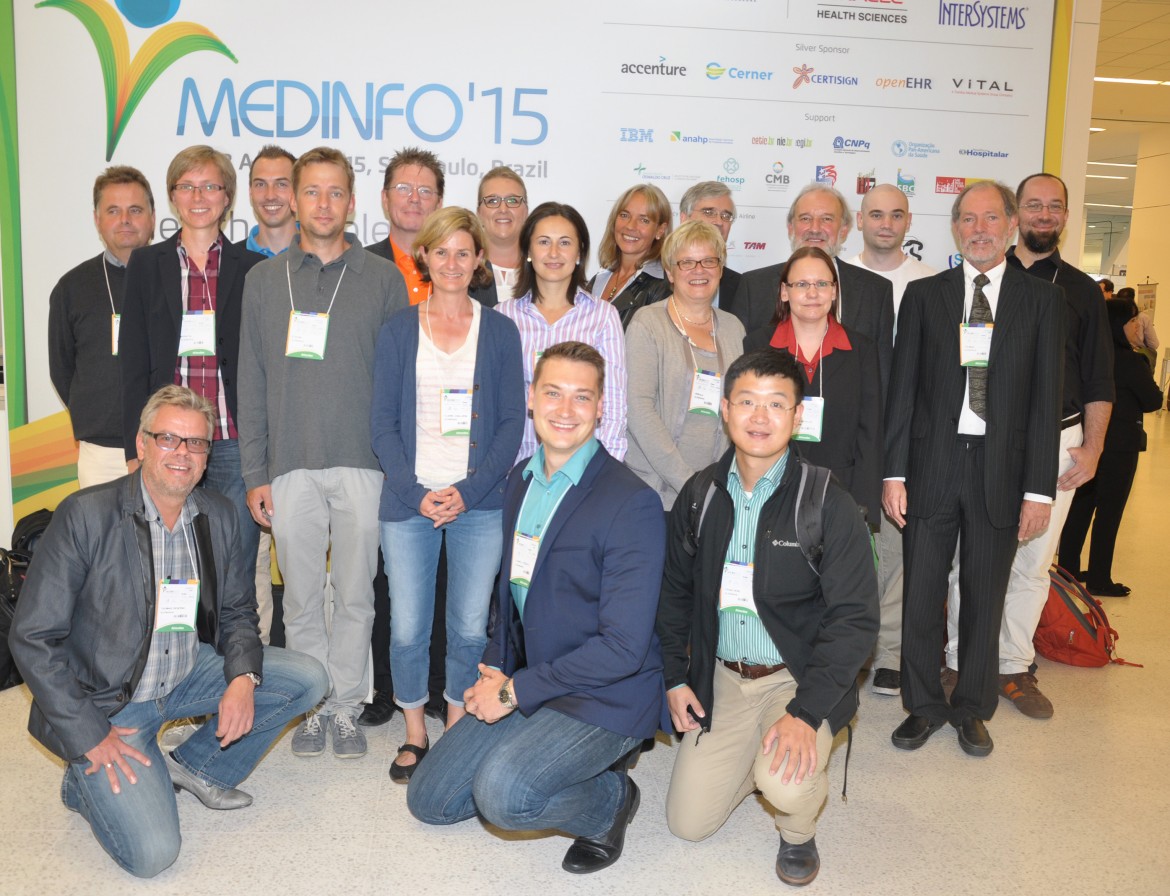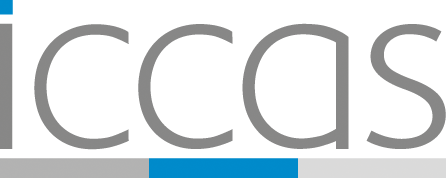23.11.2015
 Prof. Thomas Hierl und Prof. Andrea Robitzki im ICCAS Seminar
Prof. Thomas Hierl und Prof. Andrea Robitzki im ICCAS Seminar
Das ICCAS begrüßt in dieser Woche zwei Referenten in seiner Seminarreihe.
Prof. Thomas Hierl aus der Klinik und Poliklinik für Mund-, Kiefer- und Plastische Gesichtschirurgie wird zum Thema “Die AG Bildverarbeitung und Biomechanik (MKG-Chirurgie UKL) – Derzeitige Schwerpunkte und Projekte” sprechen.
Wann: Montag, 23. November 2015, 15:00 Uhr
Wo: ICCAS (Konferenzraum), Semmelweisstr. 14, 04103 Leipzig
Prof. Andrea Robitzki aus dem Biotechnologisch-Biomedizinischen Zentrum (BBZ) der Universität Leipzig referiert über “Computergestützte Bio-Zelluläre Forschung und Entwicklung”.
Wann: Dienstag, 24. November 2015, 13:30 Uhr
Wo: ICCAS (Konferenzraum), Semmelweisstr. 14, 04103 Leipzig
30.10.2015
 Sandra von Sachsen und Christian Meißner mit erfolgreicher Dissertationsverteidigung
Sandra von Sachsen und Christian Meißner mit erfolgreicher Dissertationsverteidigung
30. Oktober 2015
Sandra von Sachsen und Christian Meißner verteidigten in diesem Jahr erfolgreich ihre am ICCAS entwickelten Dissertationen.
In Dr. von Sachsens Dissertation mit dem Titel “Einsatz numerischer Simulationen für einen Vergleich von Stentgrafts in der endovaskulären Gefäßmedizin. Einsatzpotenzial, Anforderungsspezifikation und Mensch-Maschine-Schnittstelle.” stand die Unterstützung der Auswahl geeigneter Stentgrafts bei der endovaskulären Versorgung von Bauchaortenaneurysmen im Fokus. Die derzeitige Gastwissenschaftlerin arbeitete dabei mit Gefäßmedizinern aus ganz Deutschland zusammen. Die entwickelte Methode ermöglicht eine tiefergehende Auseinandersetzung der Mediziner mit numerischen Simulationen und Stentgraftbewertungsgrößen. Im Rahmen einer Benutzerstudie wurden Daten zum simulierten Verhalten einer implantierten Endoprothese ermittelt, die einen Beitrag zur Verringerung möglicher Komplikationen leisten können. Weiterhin wurden geeignete Darstellungsformen zur Bereitstellung von Simulationsdaten im klinischen Umfeld untersucht. Für ihre Promotionsleistung erhielt von Sachsen die Bestnote “summa cum laude”.
Dr. Meißner, der von 2008 bis 2013 am ICCAs tätig war, beschäftigte sich in seiner Doktorarbeit „Perspektivorientierte Erkennung chirurgischer Aktivitäten im Operationssaal“ mit der automatischen Erkennung chirurgischer Arbeitsabläufe. Diese sind ein wichtiger Bestandteil der Entwicklung automatischer chirurgischer Assistenzen. Es wurde ein Modell entworfen, das die chirurgischen Aktivitäten über Sensorik und Mustererkennung erfasst. Die Ergebnisse zeigen eine grundlegende Eignung des Modells für verschiedenste chirurgische Eingriffstypen. Meißner erhielt die Bewertung magna cum laude.
Das ICCAS gratuliert den beiden Wissenschaftlern zum Doktortitel und wünscht ihnen weiterhin viel Erfolg!
27.10.2015
 ICCAS-Präsentationen auf der IEEE HealthCom 2015
ICCAS-Präsentationen auf der IEEE HealthCom 2015
27. Oktober 2015
Juliane Neumann und Bernhard Glaser besuchten im Rahmen der IEEE HealthCom 2015 (Boston, USA) den ersten Internationalen Workshop für Intelligente Operationssäle. Auf diesem tauschten sich Kliniker, Wissenschaftler und Ingenieure aus aller Welt zum gemeinsamen Forschungsgegenstand eines Operationssaales mit hoher Umgebungsintelligenz aus.
Juliane Neumann referierte über die standardisierte semantische Modellierung chirurgischer Workflows. Dabei beschrieb die Informatikerin eine Methodik zur standardisierten Erstellung und Visualisierung chirurgischer Prozessmodelle auf Basis einer Ontologie. Zu diesem Zweck wurde eine Machbarkeitsanalyse anhand einer neurochirurgischen Operation vorgestellt.
Bernhard Glaser stellte die Ergebnisse einer Studie unter OP-Schwestern vor, die deren unterschiedliche Beschreibungen von chirurgischen Instrumenten nachweist. Unstimmigkeiten in diesem Zusammenhang führen nicht selten zu Störungen im OP-Ablauf. Der am ICCAS entwickelte “Nosco Trainer” – ein interaktives System, mit dem OP-Personal die richtige Auswahl von Instrumenten trainieren kann – soll hier Abhilfe schaffen. Glaser wird die Funktionsweise und Vorteile des „Nosco Trainers“ auch auf dem diesjährigen „dies academicus“ der Universität Leipzig präsentieren.
Zu dem übergeordneten Thema der chirurgischen Prozess- und Workflowmodellierung steht ein Technical Report zum Download zur Verfügung: Link
06.10.2015
 Sachsen zieht Bilanz – ICCAS mit präsent
Sachsen zieht Bilanz – ICCAS mit präsent
Im Zuge der 25 Jahrfeier Sachsens zieht der Freistaates stolz Bilanz und schaut gleichzeitig in die Zukunft, wie es in der Sonderbeilage aller sächsischen Tageszeitungen am vergangenen Wochenende zu sehen war. Das ICCAS findet sich darin als ein Beispiel der vielen wirtschaftlichen Erfolgsgeschichten wieder.
05.10.2015
 ICCAS lädt zum 6. M2CAI Workshop ein
ICCAS lädt zum 6. M2CAI Workshop ein
 Fort the sixth time, ICCAS is co-organizer of the Workshop on “Modeling and Monitoring of Computer Assisted Interventions – a satellite event of the International Conference on Medical Image Computing and Computer Assisted Interventions (MICCAI).
Fort the sixth time, ICCAS is co-organizer of the Workshop on “Modeling and Monitoring of Computer Assisted Interventions – a satellite event of the International Conference on Medical Image Computing and Computer Assisted Interventions (MICCAI).
Visitors come across an internationally appreciated forum where clinicians, researchers and medical companies discuss issues and solutions on the acquisition, analysis, modeling, and monitoring of computer assisted interventions. A variety of elemental technologies, integration and implementation is required for the contextual operating room of the future. The workshop will establish a new generation of context-aware Computer Assisted Intervention (CAI) systems.
Location: MICCAI 2015, Gasteig München
Day: Friday, 9 October 2015
Time: 8:30am – 12.30pm

29.09.2015
 ICCAS auf der 14. Jahrestagung der CURAC in Bremen
ICCAS auf der 14. Jahrestagung der CURAC in Bremen
29 September 2015
The Annual Conference of the German Society for Computer and Robot-Assisted Surgery (CURAC) in Bremen is the central German-language forum in computer and robot-assisted surgery. It brings together basic research and practical applications. ICCAS also benefited from the intensive professional dialogue between clinicians, technicians, users and developers by contributing its own papers and an information booth.
Max Rockstroh’s presentation addressed the use of an open communication infrastructure of the type already being implemented at ICCAS to support the surgical process, which entails linking up operating technology, sensors and workflow management. As an invited speaker, Rockstroh also reported on the progress made by the flagship project OR.Net. He mainly spoke about the implementation of the developments in the five demonstrators. He emphasized the importance of being able to network different medical devices in the operating room and clinic in order to support operations by means of surgical process models. Meanwhile, Richard Bieck introduced a new concept for interaction between surgeons and assistance systems in computer-aided neurosurgery. Marianne Maktabi’s paper discussed various methods used to analyze surgical workflows. And at the poster session, Bernhard Glaser presented his new concept for sterile interaction in the digital operating room based on eye-tracking technology to enable lightweight, realistic solutions.

 ICCAS-Sessions auf der BMT 2015 in Lübeck
ICCAS-Sessions auf der BMT 2015 in Lübeck
29 September 2015
For years, ICCAS has included papers in the scientific program of the Annual Conference of the German Society for Biomedical Engineering (DGBMT). This time, ICCAS researchers held two sessions of their own. During the first session headed by Professor Thomas Neumuth and Dr. Claire Chalopin, a prototype system for computer-assisted neurosurgery was explained. The clinicians suggested harnessing the system’s mobility for applications outside the operating room, such as at the bedside. Other presentations dealt with the situational involvement of technology in operations to support surgery, standardized semantic workflow modeling, and a concept for displaying process and situation related information in an operating network.
The second session chaired by Professor Andreas Melzer and Professor Thomas Neumuth addressed a general concept for the development of model-guided clinical decision support systems. One paper dwelt on model-based brain tumor segmentation using intraoperative ultrasound images. Furthermore, Professor Melzer explained the applications of magnetic resonance-guided focused ultrasound as a computer-assisted theranostic method.
The DGBMT promotes cooperation between scientists, engineers and physicians in research, development, application and teaching. It supports the transfer of knowledge between different disciplines in biomedical technology and works towards the rapid translation of new technologies into clinical applications. The annual DGBMT conference is an important platform for these aims.
 ICCAS mit Workshop auf der MEDINFO
ICCAS mit Workshop auf der MEDINFO
29. September 2015
Auf dem 15. MEDINFO-Weltkongress trafen im August die weltweit führenden Experten im Bereich eHealth und Biomedizinische Informatik zusammen, um gemeinsam herausfordernde Probleme in der Gesundheitsversorgung und biomedizinischen Wissenschaft anzugehen. Das ICCAS leistete einen wesentlichen Beitrag mit seiner Forschung am Digitalen Patientenmodell. In einem Workshop unter Leitung von Dr. Kerstin Denecke wurden weit reichende Kenntnisse aus diesem Arbeitsfeld präsentiert. Dr. Claire Chalopin stellte Ergebnisse zu einem Patienteninformationsmodell vor, das die Therapie bei Tumoren der Hirnanhangsdrüse unterstützen soll. Dieses fußt auf dem openEHR-Standard. Patientendaten, Behandlungsberichte, Befunde und Bilder werden darin standardkonform dargestellt. Das dahinterstehende technische Konzept erläuterte Stefan Kropf. Die Ergebnisse stießen in der openEHR Community – die weltweit eine wachsende Nutzergemeinschaft verzeichnen kann – auf großes Interesse. Das ICCAS soll nun zur weiteren Entwicklung flexibler E-Health-Systeme beitragen.
Andere ICCAS-Vorträge beschäftigten sich mit Methoden der Informationsextraktion und des Textmining zur Realisierung von modellbasierten Unterstützungssystemen für Therapieentscheidungen sowie mit probabilistischer Modellierung. Zudem unterstütze Kooperationspartner Dr. Koray Atalag von der University of Auckland (Australien) den Workshop in Sao Paulo mit seinem Wissen zur Modellierung der menschlichen Physiologie. Bernhard Glaser aus dem Forschungsfeld Modellbasierte Automation und Integration präsentierte auf der Konferenz den Prototypen eines interaktiven Trainingssystems für OP-Personal.
17.09.2015
 Physiker Prof. Georg Rose vom Magdeburger Forschungscampus im ICCAS-Kolloquium
Physiker Prof. Georg Rose vom Magdeburger Forschungscampus im ICCAS-Kolloquium
Am 30. September 2015 wird Prof. Georg Rose vom Magdeburger Forschungscampus STIMULATE über neue Technologien für Bildgebung und Interventionen sprechen. Die Veranstaltung findet in der Liebigstraße statt. Alle Interessenten sind herzlich eingeladen.
Datum: Mittwoch, 30.09.2015
Uhrzeit: 16:00 Uhr
Ort: „Glaskasten“ im Haus 4, Liebigstraße 20, Leipzig
Vortrag: Der Magdeburger Forschungscampus STIMULATE- Neue Technologien für Bildgebung und Intervention
Im Mittelpunkt der Forschungsaktivitäten steht die Entwicklung von innovativen bildgeführten minimal-invasiven Operationen für gesellschaftlich höchst relevante Krankheitsbilder. Die zentralen Vorteile der minimal-invasiven bildgestützten Methoden liegen sowohl in der geringen körperlichen Belastung für Patienten (kurze Liegedauer, schnelle Genesung) – für schwer kranke Patienten stellen diese Methoden häufig die einzige Therapieoption dar – als auch in der Senkung der Behandlungskosten für das Gesundheitswesen.
Der inhaltliche Fokus von STIMULATE liegt auf ausgewählten neurologischen und onkologischen Erkrankungen. Einerseits fokussiert STIMULATE auf Tumore der Leber und der Wirbelsäule. Andererseits konzentriert sich der Forschungscampus auf die Entwicklung medizintechnischer Lösungen für Schlaganfallpatienten. Die Ausrichtung auf Themen der anwendungsnahen Grundlagenforschung stärkt den Transfer- und Translationsgedanken.
Forschungsschwerpunkte von Prof. Georg Rose:
- Interventionelle Bildgebung, insbesondere Röntgen und CT
- Instrumente für bildgeführte Eingriffe, insbesondere für Röntgen und MRT
- Brain-Machine-Interfaces
- Telemedizin und medizinische Telematik
Zur Person: Prof. Georg Rose ist seit dem 1.1.2006 als Professor für Medizintechnik an der Fakultät für Elektro- und Informationstechnik an der Otto-von-Guericke Universität Magdeburg tätig (www.LMT.OVGU.de). Er baute hier den Schwerpunkt Medizintechnik auf, initiierte und etablierte den internationalen Masterstudiengang Medical Systems Engineering sowie den Bachelor für Medizintechnik. Darüber hinaus warb er zahlreiche Drittmittelprojekte ein, so zuletzt federführend den BMBF-Forschungscampus STIMULATE, dessen Sprecher er ist.
Kontakt:
Prof. Dr. rer. nat. Georg Rose
Lehrstuhl Medizinische Telematik und Medizintechnik
Gebäude 09, Universitätsplatz 2, 39106, Magdeburg, G09-324
Tel: 0391-67-18862 (G09)
Georg.Rose@ovgu.de
09.09.2015
 ICCAS mit neuen OP-Technologien auf EMBC-Konferenz
ICCAS mit neuen OP-Technologien auf EMBC-Konferenz
09. September 2015
Im Rahmen eines eingeladenen Vortrags stellte ICCAS-Informatiker Stefan Franke (MAI) auf der EMBC-Konferenz neue Technologien für den fortschrittlichen Operationssaal vor. Dazu zählen die workflow-gestützte Teilautomation von Medizingeräten sowie die intelligente Darstellung von Patienteninformationen und OP-Dokumentationen. ICCAS-Informatiker Max Rockstroh (MAI) erläuterte seine Arbeiten zur webbasierten Visualisierung von Anästhesiedaten anhand eines Posters.
Die International Conference of the IEEE Engineering in Medicine and Biology Society (EMBC) ist eine der bedeutendsten Konferenzen für Entwicklungsarbeiten im Bereich Medizintechnik. Sie bietet ein exzellentes Forum für den internationalen Austausch zwischen Informatikern, Ingenieuren und Medizinern. Schwerpunkte sind bild- und modellgestützte Interventionen, Entscheidungs- und Therapieunterstützung sowie computerassistierte Bildgebung.
